
DALHOUSIE REVIEW
Scope & Guideline
Engaging Minds Through a Legacy of Intellectual Exploration
Introduction
Aims and Scopes
- Literary Exploration:
The journal focuses on diverse forms of literary expression, including poetry, fiction, and creative non-fiction, showcasing the work of both established and emerging writers. - Cultural Critique:
It engages with cultural narratives and critiques, often reflecting on societal issues through literature, thereby fostering a dialogue between art and contemporary life. - Interdisciplinary Approach:
The Dalhousie Review encourages interdisciplinary scholarship, integrating insights from various fields such as history, philosophy, and social sciences to enrich literary analysis. - Author Interviews and Reviews:
The journal includes interviews with authors and reviews of significant literary works, providing readers with deeper insights into the creative process and literary landscape. - Regional and Global Perspectives:
While rooted in Canadian literature, the journal also embraces global narratives, allowing for a rich tapestry of voices and experiences to be presented.
Trending and Emerging
- Exploration of Identity:
There is a notable increase in works that delve into themes of identity, including race, gender, and sexuality, reflecting a broader societal focus on inclusivity and representation. - Environmental Themes:
Recent publications show a growing emphasis on environmental issues and narratives that explore humanity's relationship with nature, indicating a response to global ecological concerns. - Experimental Narratives:
The journal is increasingly publishing experimental and non-linear storytelling techniques, showcasing innovative approaches to narrative structure and form. - Mental Health and Well-being:
A rising trend in the exploration of mental health themes is evident, with writers addressing psychological struggles and societal pressures, fostering greater awareness and dialogue. - Intertextuality and Adaptation:
There is an emerging interest in intertextual works and adaptations of classic literature, reflecting a contemporary engagement with historical texts through modern lenses.
Declining or Waning
- Traditional Literary Forms:
There seems to be a waning interest in conventional storytelling structures and traditional poetic forms, with more experimental and avant-garde approaches gaining traction. - Historical Fiction and Nostalgia:
Themes centered around historical fiction or nostalgia appear less frequently, possibly indicating a shift towards contemporary issues and modern narratives. - Purely Academic Criticism:
There is a noticeable decline in purely academic literary criticism, as the journal leans more towards accessible and engaging writing that appeals to a broader audience. - Regionalism:
While the journal has historically included a focus on regional literature, this emphasis seems to be diminishing, with a growing tendency towards universal themes and global narratives. - Autobiographical Narratives:
The prevalence of personal memoirs and autobiographical writing appears to be decreasing, as the journal shifts towards more fictional and creative explorations.
Similar Journals
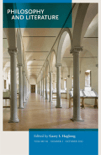
PHILOSOPHY AND LITERATURE
Unraveling the Threads of Philosophy through Literature.PHILOSOPHY AND LITERATURE is a distinguished journal published by Johns Hopkins University Press, dedicated to exploring the intricate relationships between philosophical inquiry and literary expression. With an ISSN of 0190-0013 and an E-ISSN of 1086-329X, this journal has established itself as a noteworthy platform for scholars in the fields of literature and literary theory, as well as philosophy, inviting a diverse array of critical perspectives. Since its inception, the journal has evolved, with the most recent converged years extending from 2002 to 2024. It currently holds a Q3 ranking in Literature and Literary Theory and a Q4 in Philosophy for the year 2023, reflecting its commitment to academic rigor and scholarly contribution. Although it does not offer open access, it remains an essential resource for researchers, professionals, and students eager to engage with thought-provoking discussions and analyses. With its unique focus on the interplay between narrative and philosophical paradigms, PHILOSOPHY AND LITERATURE continues to be instrumental for those looking to deepen their understanding of the human experience through the lenses of both literary art and philosophical thought.

AKZENTE-ZEITSCHRIFT FUR LITERATUR
Celebrating the Richness of Literary TraditionAKZENTE-ZEITSCHRIFT FUR LITERATUR is a distinguished journal in the field of literature and literary theory, published by Carl Hanser Verlag, a revered name in German publishing. Operating from Germany, the journal has contributed significantly to literary discourse since its inception. With an ISSN of 0002-3957, AKZENTE has established itself within the scholarly community, despite its coverage in Scopus being discontinued since 2020. It currently holds a Q3 quartile ranking in Literature and Literary Theory for 2023, reflecting a solid position among its peers. Although classified as non-open access, the journal serves as a vital platform for researchers, professionals, and students interested in deepening their understanding of literary analysis and theory. The thoughtful selection of scholarly articles and critical essays featured in AKZENTE not only fosters intellectual exchange but also promotes the exploration of contemporary and historical literary topics, making it an essential resource for those dedicated to the study of literature.

AUSTRALIAN LITERARY STUDIES
Navigating the Rich Tapestry of Australian Literary ExpressionAUSTRALIAN LITERARY STUDIES, published by The University of Queensland, is a prominent journal in the field of literary studies dedicated to promoting discourse and scholarship in Australian literature. With an ISSN of 0004-9697 and E-ISSN 1837-6479, the journal provides a rigorous platform for researchers and academics to explore the rich tapestry of literary expression within Australia, from historical contexts to contemporary practices. Although not an open-access journal, it plays a vital role in advancing critical analysis, theory, and methodological innovation, as evidenced by its Q3 categorization in Literature and Literary Theory and its Scopus ranking of #459 out of 1106 journals in the Arts and Humanities sector, positioning it in the 58th percentile. The journal covers a diverse range of topics, making it an essential resource for scholars and students who seek to understand and contribute to the ongoing conversation around literary culture in Australia. Converging years from 2002 to 2024, AUSTRALIAN LITERARY STUDIES continues to be a pivotal publication leading the way in Australian literary scholarship.
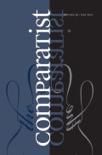
Comparatist
Cultivating Intellectual Exchange in Comparative StudiesComparatist is a distinguished journal published by the University of North Carolina Press, focusing on the interdisciplinary exploration of comparative literature, culture, and critical theory. With its ISSN 0195-7678 and E-ISSN 1559-0887, this journal serves as an essential platform for scholars and practitioners to engage with diverse literary traditions and foster dialogues across cultural boundaries. Targeted at researchers, professionals, and students, Comparatist publishes original research articles, critical essays, and theoretical perspectives that contribute significantly to the understanding of comparative studies in literature. The journal is committed to advancing the field by offering fresh insights and fostering intellectual exchange among a global audience. Although it currently does not offer Open Access options, Comparatist maintains a robust reputation within its discipline, making it an invaluable resource for those seeking to deepen their understanding of comparative methodologies and literary discourse.
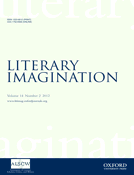
Literary Imagination
Advancing Critical Perspectives in LiteratureLiterary Imagination, published by Oxford University Press, is an esteemed journal that delves into the intricate world of literature and literary theory. With the ISSN 1523-9012 and the E-ISSN 1752-6566, this journal serves as a pivotal platform for scholars and practitioners in the field, striving to advance the understanding of imaginative literature from various critical perspectives. Boasting a 2023 rank of #751 out of 1106 in the Arts and Humanities category on Scopus, and categorized in the Q3 quartile for literature and literary theory, the journal is recognized for its contribution to the academic discourse. It aims to foster a vibrant academic community through the publication of innovative research, critical essays, and interdisciplinary studies that engage with the complexities of literary creation from 2009 to 2024. While currently not an open access journal, its rich repository of scholarly work remains accessible to researchers, professionals, and students aiming to enrich their understanding of literary narratives and their theoretical frameworks.

INFINI
Unveiling Complexities in Literary Texts and ContextsINFINI is a distinguished academic journal published by EDITIONS GALLIMARD, focused on the fields of Literature and Literary Theory. With a commitment to advancing scholarship, INFINI provides a platform for innovative research and critical discourse, contributing significantly to the literary discourse landscape since its inception. The journal, which has achieved a Q3 ranking in the 2023 category of Literature and Literary Theory, aims to foster a deeper understanding of literary texts, contexts, and theories through rigorous analysis and scholarly dialogue. Though it currently does not offer open access, INFINI remains an essential resource for researchers, professionals, and students dedicated to exploring the complexities of literature. By continuously publishing thought-provoking articles, INFINI plays a crucial role in shaping the future of literary studies. For more information or to submit your work, you can reach out to them at their address in Paris, France: 5 RUE SEBASTIEN-BOTTIN, 75328 PARIS, CEDEX 07, FRANCE.

YALE FRENCH STUDIES
Enriching the Academic Landscape of Francophone StudiesYale French Studies is a prominent academic journal published by Yale University Press in the United States, dedicated to advancing the discourse on Francophone literature, culture, and thought. With an ISSN of 0044-0078, this journal serves as a vital platform for interdisciplinary scholarship, encompassing areas such as cultural studies, history, and sociology. Although it operates under a traditional subscription model, its contributions are significant, particularly between the converged years spanning 2002 to 2014, 2018 to 2019, and 2021 to 2023. The journal currently holds Q4 rankings in various categories, including cultural studies and visual arts, and offers rich, scholarly insights that are crucial for researchers, professionals, and students alike. As an esteemed publication in the realm of literature and literary theory, Yale French Studies is instrumental in fostering a deeper understanding of French cultural contexts and their global implications, marking it as an essential resource for anyone engaged in Francophone studies.
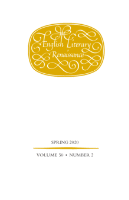
ENGLISH LITERARY RENAISSANCE
Championing Innovative Approaches to Literary AnalysisENGLISH LITERARY RENAISSANCE, published by University of Chicago Press, stands as a pivotal academic journal in the realm of Literature and Literary Theory. With a historical pedigree dating back to 1971, this esteemed journal has made significant contributions to the study of English literature, exploring a wide array of themes, methodologies, and critical interpretations that underscore the richness of literary discourse. The journal is ranked in the Q2 category for literature and literary theory and is positioned in the 89th percentile in the Scopus rankings, affirming its impact within the field. Although it does not operate under an open access model, ENGLISH LITERARY RENAISSANCE continues to attract a vibrant community of scholars and educators eager to engage with its rigorous scholarship and innovative approaches. This journal not only serves as a platform for groundbreaking research but also fosters critical dialogue that shapes the future of literary studies.

Wenshan Review of Literature and Culture
Bridging Disciplines, Enriching PerspectivesWenshan Review of Literature and Culture, an esteemed journal published by NATIONAL CHENGCHI UNIVERSITY in Taiwan, serves as a vital platform for interdisciplinary scholarship in the realms of literature and cultural studies. With its ISSN 2077-1282 and E-ISSN 2077-1290, this journal aims to engage researchers, professionals, and students alike in critical discourse while significantly contributing to the academic community's understanding of contemporary literary and cultural phenomena. As of 2023, it holds a respectable position in Q4 for Cultural Studies and Q3 for Literature and Literary Theory, reflecting its growing influence within these disciplines. Although it operates under a non-open access model, the journal's commitment to quality research is evident in its rigorous peer-review process and dedication to publishing innovative ideas. By converging diverse perspectives from 2016 through 2024, the Wenshan Review not only fosters a deeper understanding of its subjects but also acts as a bridge connecting scholars from various backgrounds to share their insights more broadly and effectively.
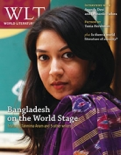
WORLD LITERATURE TODAY
Fostering Dialogue in the Realm of Global LiteratureWORLD LITERATURE TODAY, published by UNIV OKLAHOMA PRESS, is a premier journal dedicated to the exploration of global literature and its multifaceted cultural implications. With an ISSN of 0196-3570 and an E-ISSN of 1945-8134, this periodical has established itself as an important platform for scholars, writers, and cultural critics from around the world. Since its inception, it has successfully navigated through a diverse array of literary theories and practices, contributing significantly to the discourse within the field, as evidenced by its Q3 ranking in Literature and Literary Theory. Despite its ongoing tenure that extends from 2002 to 2024, it offers no open access options, emphasizing the value of its curated content. Positioned within the United States and housed in the historic UNIVERSITY PRESS BUILDING in Norman, Oklahoma, WORLD LITERATURE TODAY continues to engage and challenge its readers, making it an essential resource for those passionate about the nuances of literature across cultural contexts. Its unique blend of critical essays, interviews, and reviews makes it indispensable for researchers, professionals, and students alike who seek to enrich their understanding of the literary world.